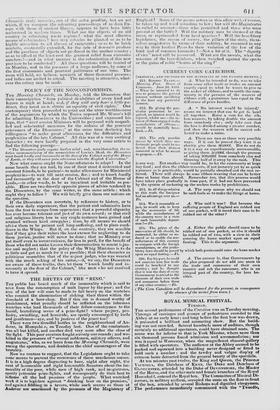CURRENT CORN CATECHISM.
[ORIGINAL, AND FOUNDED ON TI1E MATERIALS OF THE PASSING MOMENT.3
Morning Post. House of Co lllll ions. June 20, 0334. — What he intended to do
was to pt te the general interest without sacrificing in the least any paiticular interest.
211. thrums TRADE.— A. What he intended to do, was to take from some other trade or trades an amount exactly equal to what lie wants to give to the maker of ribbons, and to saddle the com- munity in the persons of the wearers of ribbons with a gratuitous loss equal to the difference of price besides.
A. " No interest would be injured,' means no interest that can be got to bawl all together. Raise a sum fOr the rib- bon, weavers, by taking double the amount from somebody else ; only take care that the loss is divided among a greater number, and then the weavers will be easiest col- lected to make a noise.
A. There are two or three very possible ways. If it can be proved they want it as charity. give them 50,000/. But do not do it in a way so superhumanly unreasonable, as giving them 50,000/. through the process of taking 100,000/. from somebody else and throwing half of it away by the road. This is one way. But another way would be, to let the community at large buy food ; and then the ribbon-weavers, if not instantly yet by as quick a process as is practicable, would be partially absorbed and the rest re- lieved. There will always be some ribbon-weaving that can be better done at home than abroad. Remember too, that this process would have taken place gradually in time past, if it had not been prevented by the system of coekering up the useless trades by prohibitions.
214. In all things relative to this trade the foreigner had an advantage over us.— lb.
214. Was it reasonable or just, he would ask, to keep up the necessaries of life while the manufactures of the country were in a state of such lamentable depres- sion ?-1b.
215. The prices of the necessaries of life should, he contended, be either so re- duced as to enable the ma- nufacturers of this country to compete with the fonign manufacture, or else prohi- bitory laws should be passed b upon an equal footing.—Ib.
216. For his pall, he could not conceive how free trade could be beneficial to any country ; and he thought that it was time duty of every Government to attend to the interests of their own trade and commerce before those of any other country.--lb. (The Corn Catechism will be discontinued for the present, in consequence nf the absence qf the writer front town.)
212. By giving the par- ticular protection he re- quired, no interest would be injured, whilst one—the in- terest of those engaged in the manufacture of ribbons — would be materially bene- fited.—Ib.
213. The only possible means by which these un- fortunate people could hue re- lieved front their distress consisted in what he meant to propose.—Ib. A. The very reason why we should not be such fools as to make the things at home.
A. Who said it was? But because the suffering people of England are robbed out of one pocket, will it mend their case to be robbed out of the other?
A. Either the public should cease to be robbed out of one pocket, or else it should be robbed out of two, with a view to their entering the home market upon an equal footing. This is the argument.
y which both partieseould enter the home market
A. The answer is, that Governments by the plan proposed do not add one atom to the trade and commerce of their own country and rob the consumer, who is an integral part of the country, for love be- sides.






















 Previous page
Previous page